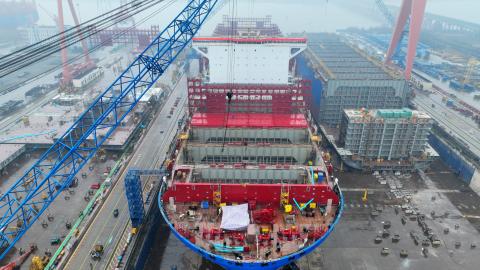As the House and Senate put together their versions of this year’s defense-budget bill, there is a growing sense that it could include the most consequential update of U.S. maritime policies in many decades. Congress last reset those policies in the immediate post-Cold War era, when it assumed that America would always be the world’s sole superpower and the defense value of the commercial maritime industry was in doubt. In the past few years, much has happened to change those assumptions. China has leveraged the world’s largest shipbuilding industrial base to build the world’s largest navy. Russia’s battlefield failures have revealed the continued importance of logistics to military success. And a supply-chain crisis has demonstrated America’s vulnerability to a commercial maritime-logistics system over which it has no control.
In no strategically important sector is China’s advantage over the U.S. more pronounced than in the commercial maritime industry. Using extensive government support and other advantages, China’s commercial fleet (including ships owned in Hong Kong) is the largest in the world, numbering more than 10,000 large vessels. Chinese companies have stakes in about 100 ports outside of China, including ports adjacent to nearly every chokepoint in global maritime trade. Chinese companies also control key sources of shipping information and have become major players in marine finance, insurance, and related industries.
As a result, China today has unmatched control over the circulatory system that feeds our global economy. This gives Beijing the power to inflict extraordinary damage on the U.S. economy or the economies of U.S. allies by limiting the flow of goods through the maritime supply chain, which could prove an effective counter to America’s control of the international payments system.
China’s dominance of maritime manufacturing is perhaps of even greater concern. Its commercial shipbuilding industry won 63 percent of new ship orders last year and is now slated to produce more ships than the rest of the world combined. Billions of dollars flow each year from these purchases to strengthen the People’s Liberation Army Navy (PLAN), which is growing increasingly competitive with the U.S. Navy. Chinese-made shipping containers and container cranes dominate global markets, contributing not only to China’s industrial base but also to its ability to surveil and potentially sabotage maritime operations should it choose to do so.
In contrast, the entire U.S. flag commercial fleet numbers fewer than 200 cargo ships, and almost none of them operate in Western Pacific markets. Should a conflict with China break out, America’s fleet would be much too small to meet the U.S. military’s basic resupply requirements. The U.S. is simply a customer of global logistics supply chains and has no direct ability to prevent China from abusing them. China has more than 200 times more shipbuilding capacity than the U.S., and only a very small portion of America’s shipbuilding industrial base comes from commercial building and repair work financed by private-sector customers rather than from government work paid for by U.S. taxpayers.
Just as China tries to neutralize America’s advantages in the payments system and other strategically important areas, American policy-makers are seeking changes to mitigate risks where China has the advantage. A bipartisan, bicameral group led by Representatives Mike Waltz (R., Fla.) and John Garamendi (D., Calif.) and Senators Mark Kelly (D., Ariz.) and Marco Rubio (R., Fla.) has sounded the alarm in the commercial maritime sector. Its most recent work, an April 30 report entitled, “Congressional Guidance for a Maritime Strategy,” highlights its concerns and outlines objectives for legislation.
In recent reports, I explored China’s advantages in the commercial maritime sector and recommended specific changes that align well with those objectives. The benefits and limits of collaboration with allies that have retained substantial maritime capabilities are important parts of the discussion. But America should also take targeted steps to shore up its own commercial maritime industry and not rely solely on allies to protect its security interests in this sector. The question then becomes where and how America should reshape its policy to meet the maritime-security risks the country now faces.
Congress should keep certain principles in mind as it sorts through various proposals. It should not grasp at cheap fixes based on false premises but should understand that substantial government resources proportionate to the current threat environment will be needed. It should know specifically what to expect those resources will produce in terms of American ships and mariners added to the fleet, and shipbuilding capacity added to the industrial base. Government agencies managing those resources should be accountable for optimizing their value through innovative procurement processes and regular program reviews. And Congress should challenge the industry to meet goals of a size and on a schedule commensurate to the urgent threats of today. China may not wait for America to act before exploiting its advantages in this sector.



















